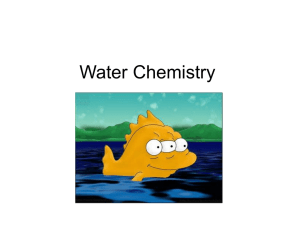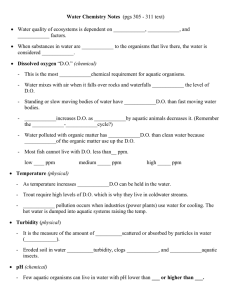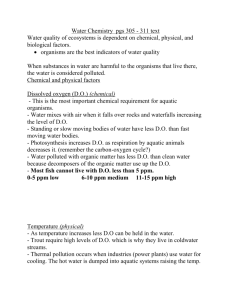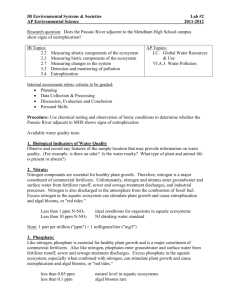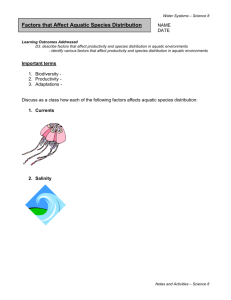Water Chemistry
advertisement
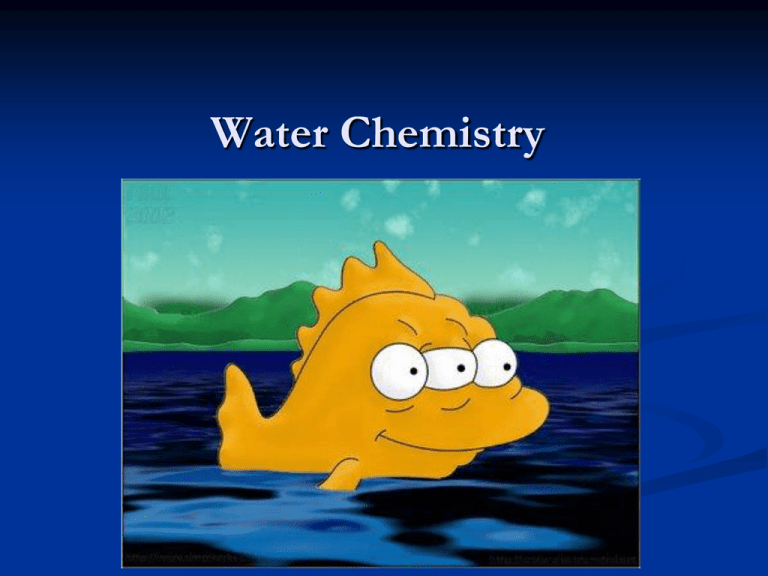
Water Chemistry Take out your Homework, Get your game face on, answer these questions in your notes… What 3 factors play a role in determining the health of an aquatic ecosystem? What is your definition for polluted water in your own words? Make a list of at least 8 things you believe pollute water. Water Quality Q: Water quality of ecosystems is dependent on what 3 categories?: A: Chemical, Physical, Biological Q: What is water pollution? When substances in water are harmful to the organisms that live there, the water is considered polluted. What is Dissolved Oxygen? (Chemical) Dissolved Oxygen is known as “D.O.” This is the most important chemical requirement for aquatic organisms. Diffusion- Water mixes with air when it falls over rocks and waterfalls increasing the level of D.O. Video of Waterfall adding DO Standing or slow moving bodies of water have less D.O. than fast moving water bodies. Example Which likely has more D.O. and why? DO Continued Q: What 2 things increases D.O. in water? A: Photosynthesis increases D.O. A: Diffusion Q: What 2 things decreases D.O. in water? A: Respiration by aquatic animals decreases it(remember C-O cycle?) A: Water polluted with organic matter has less D.O. than clean water because decomposers of the organic matter use up the D.O. Most fish cannot live with D.O. less than 5 ppm. Low- 0-5 ppm, Medium- 6-10 ppm, High- 11-15 ppm What about the fish tank. What adds DO, and what takes it away? At Night? Temperature (Physical) Q: How does temperature have an effect on water? A: As temp. increases, less D.O. can be held in water. Example: Trout require high levels of D.O. which is why they live in coldwater streams. Example Temperature Con’t Q: What is Thermal Pollution? It occurs when industries (power plants) use water for cooling. The hot water is dumped into aquatic systems raising the temperature. Q: Why does this harm wildlife in the stream? What type of plant is this, and where does the hot water come from? What is Turbidity? (Physical) It is the measure of the amount of light scattered or absorbed by particles in water (cloudiness). Q: What increases turbidity in water? A: Eroded soil in water increases turbidity, clogs fish gills, and smothers aquatic insects. Which has more turbidity? pH (Chemical) Few aquatic organisms can live in water with pH lower than 4 or higher than 9. Best range: fish 6.7 - 8.6 What could you infer if the only species you found in an environment was the Water Boatman? Example pH Continued Q: What are some things (3) that change pH of water? CO2 produced from decaying organisms forms carbonic acid decreasing pH. Sulfuric acid in water comes from acid mine drainage and acid rain (burning fossil fuels) decreasing pH. Alkaline industrial waste (bleaching plant) can increase pH. Hardness (Chemical) Water with many minerals is considered hard. Water containing calcium and magnesium is said to be hard. The minerals in hard water can buffer acidic rain water. Calcium is needed for clams, snails, and other shelled organisms. Soft: 0 - 60 ppm Medium: 60 – 120 ppm Hard: 120 – 180 ppm Lets Read about Dead Zones Read the Article and Answer the questions on Dead Zones in the Gulf of Mexico Take out your HW…answer these questions! •What are the 3 categories that affect water quality? •What factor most affects water quality? •Why is temperature so critical to an aquatic ecosystem? •What takes DO out of a system? What adds it in? •What is a wetland? •What functions does a wetland serve? •What is a watershed? •What is water pollution? What is happening to the Chesapeake? Get Out Yo HW Get out Yo Water Chemistry Notes Watch the video and write down what things (SEVERAL) are going wrong with the Chesapeake…make sure to explain your answers… Video Nitrites/Nitrate (Chemical) Runoff of fertilizers, animal wastes, and sewage are the major sources. EUTROPHICATIONExcessive nitrogen causes algae population to explode (algae bloom). Most nitrogen is constantly used up in the system. More than 1 ppm indicates excess! When the algae dies it decomposes using up the D.O. Redtide at Night!!! Video: Surfing at Night with a bacterial Night Light Video: Bioluminescent Kayaking Video: Bioluminescent Swimmers at Night Phosphates (Chemical) Comes from the same sources as nitrogen as well as some industrial processes. Used in Laundry Detergent Also causes algae blooms. Not as harmful to humans or animals as nitrogen. More than 0.5 ppm indicates excess. Hurricane Floyd 2.5 billion gallons hog/poultry waste Dead Zones
